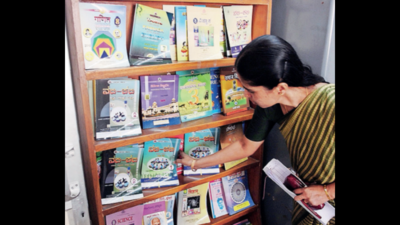Top Searches
- News
- City News
- bengaluru News
- Karnataka: Textbook revision anti-student, unnecessary, says ex-member
Karnataka: Textbook revision anti-student, unnecessary, says ex-member

Prajval Shastri, renowned scientist and a member of the previous textbook revision committee, has come out in support of Baragur Ramachandrappa, previous chairman of the panel, saying previous revisions were done in a transparent manner and keeping facts in mind.
BENGALURU: Prajval Shastri, renowned scientist and a member of the previous textbook revision committee, has come out in support of Baragur Ramachandrappa, previous chairman of the panel, saying previous revisions were done in a transparent manner and keeping facts in mind.
Prajval was part of the science textbook revision committee. In a tweet, Shastri called the current revision “unnecessary, anti-student and a disaster created based on faulty rationale and the outcome of an unprecedented faulty process”.
The astrophysicist went on to say that the issue is not a fight between political parties, but between “constitutional and unconstitutional processes”. Speaking to TOI, Shastri said the Baragur Ramachandrappa committee was constituted to rectify glaring, preposterous errors — she called them “most unprecedented unscientific content” — in textbooks.
“This included the claim in the science book that mythical Mahabharat figure Drona was a testtube baby and it was evidence of in vitro fertilisation being conducted in ancient India,” she said. “When we asked for the reference from which these textbooks were prepared, we were shown a book called Sanskrit Science, which was a collection of shlokas with English translation.”
Shastri added: “We did not blame anyone then. I don’t know what content has gone into the science textbooks now, but, given past experience, I have no confidence that they will do the right thing. They are capable of putting people who do not even know how to distinguish between scientific evidence and myth in responsible positions to modify textbooks.”
Pointing out that the government has given no reason to justify a full revision of textbooks, she also said that the process has not been transparent at all. “When we were part of the committee, we had opendoor meetings to which even the media was invited,” Shastri said. “These meetings were to show that it was not a partisan committee.
The spirit was clear: It was to provide educational content for children that is in line with aspirations of the Constitution, fostering scientific inquisitiveness and critical thinking which are essential for a democracy. Such transparency is missing now.” She said the previous science textbook revision committee that she was a member of was chaired by a science professor and had two scientists (including her) besides several high school science teachers.
“It was a proper mixture. It is not clear what the composition of the committees are like this time,” she said. The astrophysicist also raised the very basic concern of textbooks not reaching students and teachers in time before the school term starts.
Prajval was part of the science textbook revision committee. In a tweet, Shastri called the current revision “unnecessary, anti-student and a disaster created based on faulty rationale and the outcome of an unprecedented faulty process”.
The astrophysicist went on to say that the issue is not a fight between political parties, but between “constitutional and unconstitutional processes”. Speaking to TOI, Shastri said the Baragur Ramachandrappa committee was constituted to rectify glaring, preposterous errors — she called them “most unprecedented unscientific content” — in textbooks.
“This included the claim in the science book that mythical Mahabharat figure Drona was a testtube baby and it was evidence of in vitro fertilisation being conducted in ancient India,” she said. “When we asked for the reference from which these textbooks were prepared, we were shown a book called Sanskrit Science, which was a collection of shlokas with English translation.”
Shastri added: “We did not blame anyone then. I don’t know what content has gone into the science textbooks now, but, given past experience, I have no confidence that they will do the right thing. They are capable of putting people who do not even know how to distinguish between scientific evidence and myth in responsible positions to modify textbooks.”
Pointing out that the government has given no reason to justify a full revision of textbooks, she also said that the process has not been transparent at all. “When we were part of the committee, we had opendoor meetings to which even the media was invited,” Shastri said. “These meetings were to show that it was not a partisan committee.
The spirit was clear: It was to provide educational content for children that is in line with aspirations of the Constitution, fostering scientific inquisitiveness and critical thinking which are essential for a democracy. Such transparency is missing now.” She said the previous science textbook revision committee that she was a member of was chaired by a science professor and had two scientists (including her) besides several high school science teachers.
“It was a proper mixture. It is not clear what the composition of the committees are like this time,” she said. The astrophysicist also raised the very basic concern of textbooks not reaching students and teachers in time before the school term starts.
FOLLOW US ON SOCIAL MEDIA
FacebookTwitterInstagramKOO APPYOUTUBE
Looking for Something?

Start a Conversation
end of article

